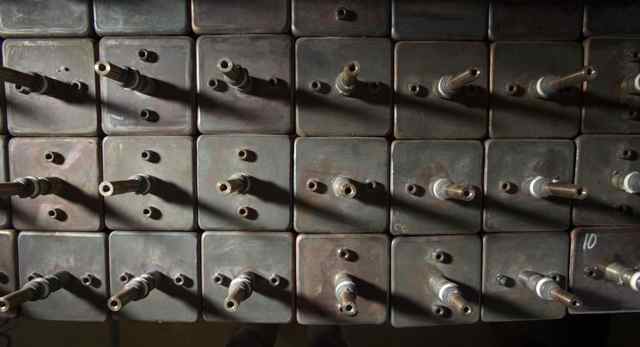forum
library
tutorial
contact

Cambridge Company's Battery May Give Grid a Boost
by Jon ChestoBoston Globe, December 30, 2014
|
the film forum library tutorial contact |

|
Cambridge Company's Battery May Give Grid a Boostby Jon ChestoBoston Globe, December 30, 2014 |
Storage devices should help electric utilities meet power demand at peak times
 It might be impossible to catch lightning in a bottle. But an MIT materials science professor, Don Sadoway, has figured out a way to pack it in a box not much bigger than a washing machine.
It might be impossible to catch lightning in a bottle. But an MIT materials science professor, Don Sadoway, has figured out a way to pack it in a box not much bigger than a washing machine.
After years of lab work at the Cambridge company that's now known as Ambri Inc., Sadoway's liquid-metal batteries will be connected to the electric grid in 2015 for the first time.
Affordable, efficient power storage is a long-sought Holy Grail for the utility industry. The grid-scale batteries currently available use the same technology that is in laptops and cellphones and are considered impractical for widescale use, in part because they break down over time.
To keep the system running reliably, a number of inefficient power plants are forced to operate only during times of peak electricity demand, remaining idle for much of the year.
Ambri's executives say they have a more affordable solution: The company's unique approach with liquid metals, developed with Bill Gates's financial help, leads to almost no degradation within the battery shells and allows for a lifespan of a decade or more.
The goal is to allow electric utilities or big industrial plants to store power so it can be released at times of high usage.
"The long-term picture is about changing the very nature of the electric system," said Ambri's chief executive, Phil Giudice, who previously was Governor Deval Patrick's energy resources commissioner. "This changes the whole grid."
In the fall, Ambri doubled the size of its first manufacturing plant in Marlborough to 10,000 square feet to accommodate at least five pilot projects and some future commercial work. The company employs 42 people now, including 15 who are expected to work in Marlborough starting in January.
Giudice said he will start looking in 2015 for a place to put Ambri's first full-size plant. He has already been courted by several New England governors who want it to be built in their states, he said, as well as by representatives of China and South Africa.
Ambri's technology has its roots in Sadoway's lab work, when the popular Massachusetts Institute of Technology professor applied his knowledge of metallurgy to electricity storage. (Sadoway remains active with Ambri as its chief scientific officer, a board member, and an equity owner.) Sadoway and cofounder David Bradwell received $7 million in federal funds in 2007 to develop the concept.
Three years later, Sadoway got a big break when an anonymous Washington resident took one of his courses remotely, Giudice said. That person, it later turned out, was Microsoft cofounder Bill Gates. He was so impressed with Sadoway that he decided to invest some of his own money in the concept in 2010.
The French energy conglomerate Total joined Gates in the firm's first investment rounds, after giving $4 million to Sadoway's MIT lab for research. By April, Ambri had received more than $50 million from a number of investors.
"They're really aiming at a big structural problem around energy storage and trying to bring a novel solution," said the chief executive of the Massachusetts Clean Energy Center, Alicia Barton. Her ratepayer-funded agency awarded $150,000 to Ambri in 2013 and gave it an additional $29,000 to subsidize interns. "This is a jumping-off point for them to what are really global markets," she said.
In 2015, Ambri will test five prototypes, including one subsidized by the Clean Energy Center at Joint Base Cape Cod and others in Hawaii, New York, and Alaska. These prototype devices will be smaller and less powerful than the commercial versions that will be delivered in 2016.
The commercial-grade "Ambri Cores," as they're called, will each be rated at 200 kilowatt hours -- or enough power for 10 to 15 homes per day -- and will typically be sold in groups of five or more. Ambri plans to complete its first commercial sale in 2016, as part of a Raytheon Co.-led project in Hawaii.
At first, Ambri will focus on isolated areas where electricity is more expensive. But there are other locations throughout the electric grid where Ambri also wants to help. The company plans to court big industrial and commercial users, as well.
Ian Bowles, managing director of the clean-energy financier WindSail Capital Group of Boston, said utilities are showing more interest in buying energy-storage devices. Ambri is "arriving at a good time where the market is just starting to form," he said.
Giudice envisions eventually opening factories -- each employing as many as 150 people -- with local partners near future clients around the world.
"They're in this by themselves, without a lot of other people doing something similar, so they can't borrow ideas from other people," said Richard Baxter, a Boston-based energy consultant.
"That also gives them a distinct advantage. If they're able to make this work, they'll be in a great situation. . . . The whole space is theirs."
learn more on topics covered in the film
see the video
read the script
learn the songs
discussion forum
